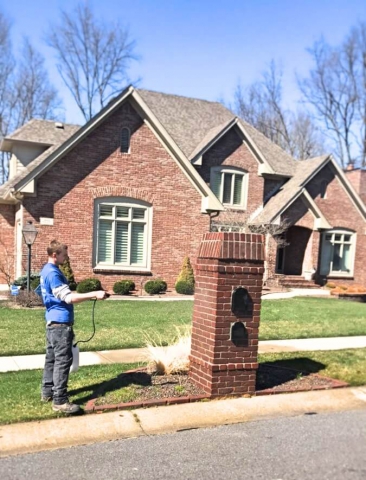Chimney Waterproofing
Brick, stone and concrete chimneys are sturdy, durable and resilient, but not indestructible. Waterproofing is crucial to prevent and fix structural damage in your chimney and avoid water damage in your home.
At Brick + Ember Outfitters, our fireplace experts are certified by the Chimney Safety Institute of America. Our team is ready to inspect and waterproof your chimney so it can continue to warm you during the cold Indianapolis winters.
Why Is Waterproofing Important?
Because they are placed above the home’s roofline, chimneys are completely exposed. Proper maintenance will prevent the chimney’s porous material from absorbing water.
The brick on a chimney is held with an extremely porous material. Left untreated, this material absorbs water, which causes the entire structure to swell and contract with temperature changes. Over time, this process leads to cracks and erosion, compromising the structure. Chimney water damage can include spalling brick and corrosion of the internal structure. To prevent extensive repair or rebuilding, you can get an inspection to look for water damage before waterproofing.
Although most chimneys are made of brick, concrete block and stone chimneys require slightly different treatment. Regardless of the construction material, all chimneys are vulnerable to water damage and need regular waterproofing to prevent structural corrosion.
Considerations for Waterproofing a Chimney
Waterproofing can be a very different operation depending on the type of chimney you own. Different construction materials and structures will require special techniques and products.
Brick + Ember Outfitters’ professional brick chimney waterproofing team will assess the chimney type and state before conducting our services. After identifying the chimney type and possible repair needs, we’ll select the right products for the job.
Choosing the Right Waterproofing Products
It can be enticing to spend less money on inexpensive waterproofing products. The fact of the matter is that your chimney is too important to compromise. Waterproofing material will break down when it is exposed to UV rays, so a high-quality product is the best way to prolong the effects of the waterproofing job.
Waterproofing products are normally made of polysiloxanes or silanes. These chemicals create an electrostatic charge that becomes a barrier to prevent water penetration. They are also vapor permeable, which means that the vapor created when you ignite your fireplace below can escape properly. Otherwise, it will build up and cause structural damage, such as metal corrosion or crumbling brick.
Brick + Ember Outfitters utilizes a product called ChimneySaver when performing waterproofing. ChimneySaver can do all that is described above. It’s designed to expel water vapors that go through bricks when using your chimney. It’s almost like a “skin” of sorts. Breathable but effective, it doesn’t trap water but expels it away from the porous masonry.
ChimneySaver is available in water-based formulas and solvent formulas with mineral spirits. The water-based formula is the most popular and affordable. However, because the solvent-based formula soaks in deeper, it is recommended for future reapplications.
Chimney Crown and Breast
The chimney breast lies at an angle, going around fireplaces and similar structures rather than straight to the ground. The angled position means more exposure to snow, rain, sunlight and other elements, which means a solvent-based waterproofing solution is best.
The chimney crown is also exposed in its position at the top of the structure, and it’s typically made of concrete or mortar — porous materials that can absorb moisture and develop cracks and leaks over time. Caulking cracks and applying solvent-based waterproofing products is the best treatment to achieve long-lasting protection.
Non-brick Chimneys
Concrete block chimneys are the most porous and in danger to water damage. More than one coat of waterproofing product is necessary. Additionally, instead of a water or solvent-based product, a solid-based treatment is preferred. This can come in the form of stucco or waterproof paint. ChimneySaver has special products for these situations.
There is a reason stucco can be used to waterproof concrete block chimneys — stucco does a fair job of repelling water as is. It does not require the extensive waterproofing that brick, concrete, or stone chimneys do.
Most stone chimneys do not work well with the chemicals in traditional waterproofing products and do not form the bonds necessary to repel water. A different product will need to be used.
Treatment Day
On treatment day, we’ll prepare for the chimney process, using cloth to cover the roof and windows so the waterproofing products don’t damage them. After that, we might apply our product with a sprayer from bottom to top in the case of vertical walls, whereas a chimney breast is coated with different layers.
Waterproofing is more than a one-time job. An extra coat will pay off in durability and a longer life span. On average, a waterproofing job will last about 20 years. However, where you live and what kind of weather you receive will vary. It is always better to schedule a chimney check-up and waterproofing sooner rather than later.
Choose Brick + Ember Outfitters for Waterproofing Services
Brick + Ember Outfitters is a team of experts committed to delivering the best service for every project. We dedicate ourselves to knowing your unique needs and using our experience, high-quality materials and techniques to ensure your chimney is in top condition.
To reduce the effects of weathering, contact Brick + Ember Outfitters to schedule a ChimneySaver waterproofing. We know how to waterproof a chimney thoroughly to prevent moisture from permeating the masonry.
Want to get started? Have questions? Call us at 463-238-3568 to speak to our team.
GET IN TOUCH
Are you ready to fix your chimney, masonry, or fireplace issues? Fill out the form below to request an appointment. One of our Outfitters will get back with you shortly.

